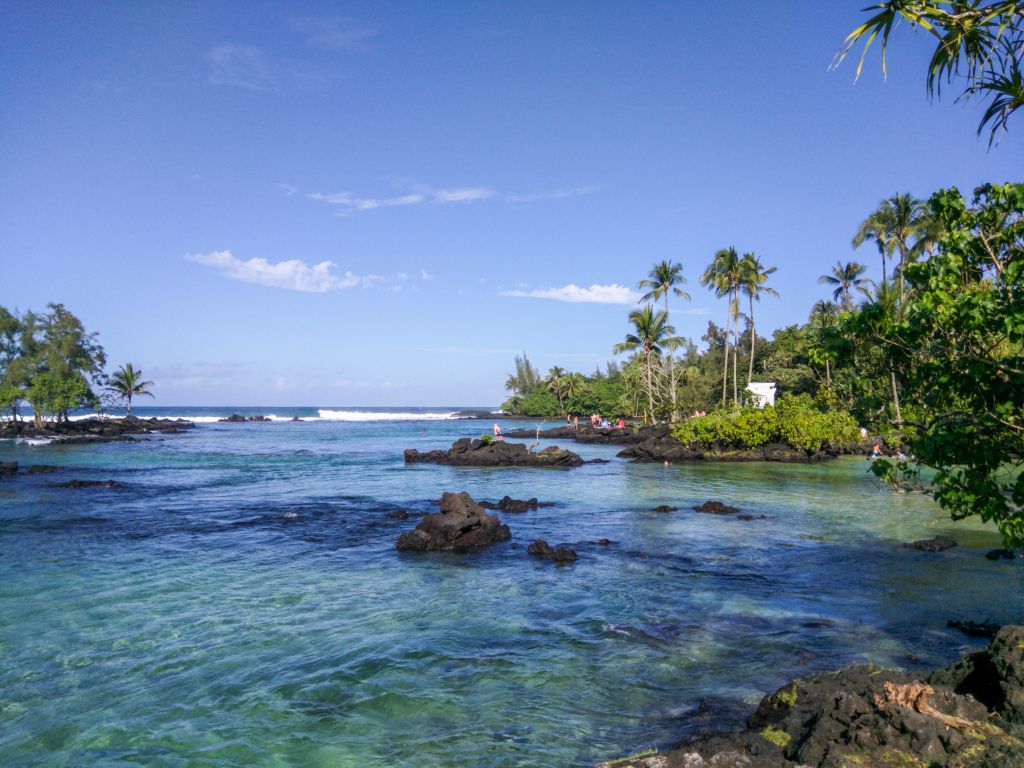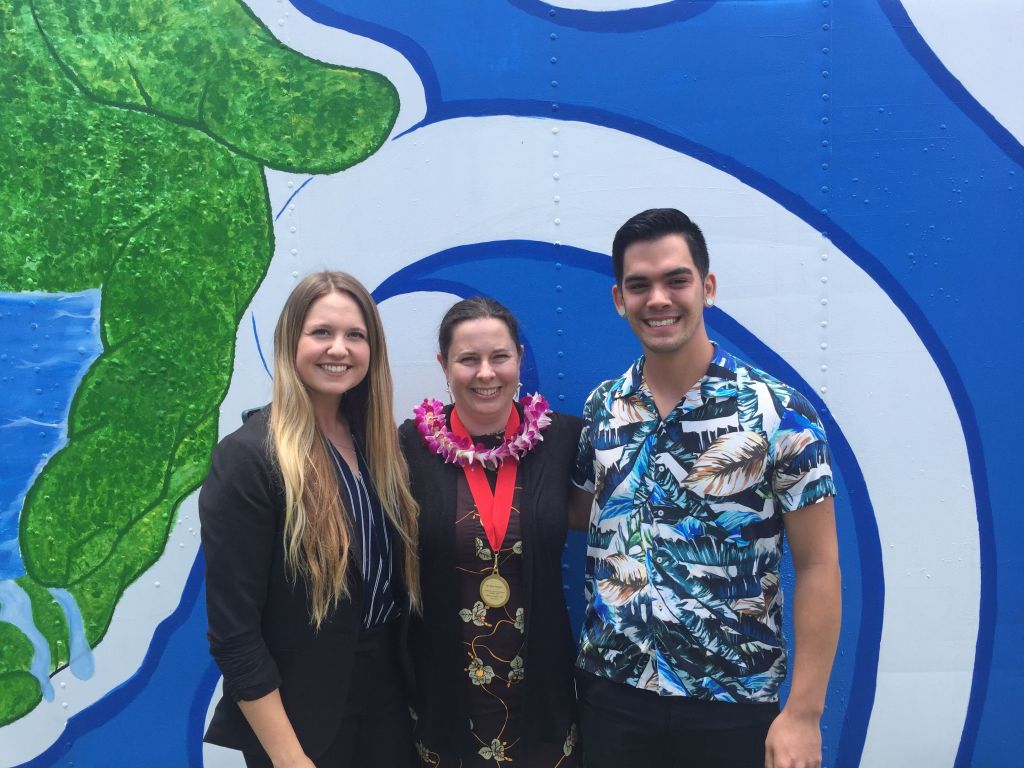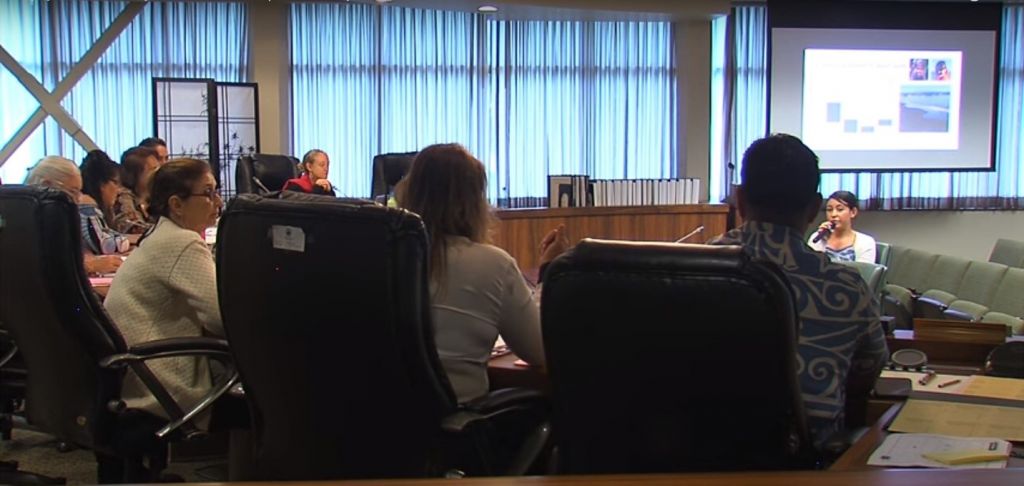A long term, multi-student project leads to recent publication
July 26, 2024

A study, partially funded by the Pacific Islands Climate Adaptation Science Center (PI-CASC), examined microbial pollution in Hilo Bay on Hawaiʻi Island and was recently published in Water Environmental Research. Led and co-led by Maria Steadmon, a researcher at the University of Hawaiʻi at Mānoa, and Tracy Wiegner, a professor of marine science at the University of Hawaiʻi at

Hilo, the study analyzed the levels of pathogens, including Staphylococcus aureus (S. aureus), commonly known as “staph,” methicillin-resistant S. aureus (MRSA), a type of staph bacteria that is resistant to many antibiotics, and fecal indicator bacteria (FIB), entering Hilo Bay from 2014 to 2017, under varying weather conditions.
Hilo Bay is located on the eastern coast of Hawaiʻi Island and has several beaches where people recreate. Beach-goers are at an increased risk of infections when exposed to pathogens in coastal waters. “This research is needed to better inform the public of their risk to recreating at local beaches and how their risk might change with changes to the climate,” said Wiegner.
The publication’s major findings were that S. aureus and FIB concentrations were roughly 6–78 times higher at beaches with freshwater discharge, both from rivers and groundwater than at those without. Elevated S. aureus was associated with lower tidal heights, higher freshwater discharge, onsite sewage disposal system density, and turbidity (water clarity).
“Climate change will affect these patterns,” said Wiegner. “Sea level rise will result in more onsite sewage disposal systems being inundated with seawater, resulting in a large export of pathogens from them with the tides.”
The predicted changes in precipitation will cause changes in river and groundwater discharge, resulting in larger more concentrated pulses of pathogen export with storms. Both conditions will increase the public risk of infection from swimming and other recreational activities.
Where it all began: A Manager Climate Corps project plants a seed

In 2016, Louise Economy was a graduate student in the Tropical Conservation Biology and Environmental Science program at UH Hilo and a member of the first cohort of the PI-CASC Manager Climate Corps (MCC). The MCC is a program that connects graduate students with faculty at UH Hilo and to existing networks and partnerships within Hawaiʻi Island’s natural resource manager communities. The aim is for the collective to conduct actionable science projects, develop locally used products, and build long-term collaborations in order to build community resilience and adaptation in the face of climate change impacts.
“I became interested in working with the Manager Climate Corps because I believe in putting science to action, and creating meaningful science that is usable and accessible to people outside of the academic community,” said Economy. “Working with managers, or people using science to support community resilience to climate change, and to create research projects with usable outcomes was compelling to me because it allows our efforts to be of direct use.”
The MCC program facilitated connecting Economy with her faculty advisor, Tracy Wiegner, and community partners, Ayron Strauch, Hydrologist at the Department of Land and Natural Resources, and Chad Shibuya, registered nurse at Hilo Medical Center. Economy’s thesis project, ”Investigating climate driven shifts in Staphylococcus aureus and MRSA for water resource and land management solutions,” showed that S. aureus and MRSA concentrations in rivers and coastal waters of Hilo increased with rainfall and that it was likely that the export of these pathogens would increase with climate change. This would ultimately increase the public’s risk for an infection.
“Our collaboration aimed to create predictive models for the entry of pathogens into recreational water systems under varying rainfall conditions, which would support Dr. Strauch’s Instream Flow Standard Assessment Reports and ultimately help inform watershed management decisions in a changing climate,” explained Economy.
Funded through PI-CASC, their work was published in the Journal of Environmental Quality in 2019.
“Louise and Tracy’s 2016-2018 MCC project and their subsequent work were fantastic examples of working closely within policy and management networks to address immediate climate change adaptation needs,” said Scott Laursen, Manager Climate Corps Coordinator. “One aspect of MCC’s foundational elements that I find particularly exciting is elevating place-based, long-term relationships across natural and cultural resource managers, policy professionals, community leaders, and cultural practitioners while immersing graduate students within such existing networks. In this way graduate students are trained and empowered within community-driven research projects in which managers are co-leads alongside researchers,” he said.
The collaboration that led to the current study
The work that Economy initiated made it possible for her to connect with students in different programs who were also excited to study potential environmental pathogens. As a result, Economy mentored three undergraduate students who built upon her initial research, addressing questions of where in the watershed these bacteria were coming from during storms and what the conditions were like at local beaches, both in terms of where people recreated. Eventually, work from these students was combined under the lead of Maria Steadmon, which culminated in the current study published in Water Environmental Research.
“By PI-CASC providing support for Louise in the Manager Climate Corps, a seed was planted and through Louise’s work and mentoring, it blossomed into several other student studies and publications, including the most recent one by Maria Steadmon. All studies are groundbreaking and PI-CASC funding was instrumental to starting it,” said Wiegner.
Economy currently works as a microbiologist at the Hawaiʻi District Health Laboratory, a Department of Health Laboratory on Hawai`i Island. There, they conduct analyses of ocean water, drinking water, milk, and shellfish products and identify human pathogens.
“Working with the MCC helped to encourage my interest in the connections between science and real-world action, and I am proud of what I do and how I can use my experience to contribute to society and support the health of my community,” said Economy.


